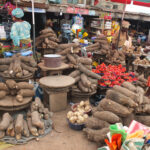Nigerians will celebrate Christmas and New Year with a hike in food prices as inflation rose to 24.13 per cent in November.
According to the National Bureau of Statistics (NBS), the food inflation rate in November was 6.92 per cent higher compared to the rate recorded in November 2021 (17.21 per cent).
The NBS said the rise in food inflation was caused by increases in prices of bread and cereals, oil and fat, potatoes, yam and other tubers, food products and fish.
It added that the headline inflation rate also rose to 21.47 per cent.
“This was 6.07% points higher compared to the rate recorded in November 2021, which was 15.40%. This means in the month of November 2022, the general price level was 6.07% higher relative to November 2021.
IPOB: Food traders boycott S/East as northerners flee
Refocus family planning discussion – Monarch
“On a month-on-month basis, the headline inflation rate in November 2022 was 1.39%. This was 0.15% higher than the rate recorded in October 2022 (1.24%). This means in November 2022, the general price level was 0.15 per cent higher relative to October 2022,” the NBS said.
It added that the increase in the monthly inflation rate can be attributed to the sharp increase in demand usually experienced during the festive season, referring to an “increase in the cost of importation due to the persistent currency depreciation, general increase in the cost of production, and increase in energy cost.”
Christmas frenzy buying will increase inflation by December – Expert
Speaking on the new figures, Chief Economic Analyst for the Economic Community of West African States (ECOWAS), Prof. Ken Ife, said inflation has a cyclical behaviour and it always picks up at the highest in December because of the Christmas frenzy buying. Sellers will be expecting lots of money to come in so they jerk up their prices.
He said it is bad that there has been an increase in the last 10 months and there won’t be any difference till the year ends.
He posits that transportation costs will be the highest because of the heavy traffic as everybody wants to move as well as goods while money saved would be spent during the period.
“It is a crime of natural rise but I can’t guarantee that it will subside next month because there are many other factors at play; we had floods that submerged over 200,000 hectares of land. When the crops affected are not available, the prices will go up and the only substitute will be imported rice which is more expensive with the dollar going up. This is because the strategic reserve we are releasing is not enough to close down the demand gap, so it is inevitable that food prices will increase,” he said.
While stating that the inflation increase was much in urban areas with a 22.09 per cent rise, he said the impact of CBN’s intervention is yet to be felt in the economy.
Also Speaking on the figures, the Director, Centre for the Promotion of Private Enterprise (CPPE), Dr Muda Yusuf, said: “The key inflation drivers have remained the depreciating exchange rate, rising transportation costs, logistics challenges, forex market illiquidity, hike in diesel cost, climate change, insecurity ravaging farming communities and structural constraints to economic activities.
He argued that fiscal deficit financing by the CBN is also a significant factor fueling inflation through high liquidity injection into the economy.
He said: “The deployment of monetary tightening tools should be put on pause. The Nigerian economy is not a credit-driven economy which is why the tightening outcomes have been inconsequential as a tool to tame inflation.”
We will cut expenses for festive season
Some Nigerians who spoke to Daily Trust said they would reduce spending to celebrate during the period to increase in food commodities.
A resident of Abuja, Paul Abel, said he usually cooks a 50kg bag of rice during the season but he plans to cut it by half with the commodity now N45,000 from N30,000 the previous years.
“A chicken that previously cost N6,000 is now N12,000. As a family we would slaughter five or six but to stick to that amount will have serious implications on our finances. We will try to celebrate it as much as we can because it is a period of joy but the skyrocketing prices of goods are getting out of hand for the government to think of a way out of the situation,” he said.
Also, Mary Chukwu said the increase has made her family purchase the little food they will eat during the period early to avoid paying more as the festivities come closer.
By Faruk Shuaibu & Sunday Michael Ogwu

 Join Daily Trust WhatsApp Community For Quick Access To News and Happenings Around You.
Join Daily Trust WhatsApp Community For Quick Access To News and Happenings Around You.


